- Home
- Alex Archer
Seeker’s Curse
Seeker’s Curse Read online
“You were fated to come here.”
Annja thought she showed no reaction but the monk chuckled.
“Oh, I know that you do not believe in fate, Annja Creed. Any more than you believe in demons. Despite the secret burden you carry. You are simply too polite to tell a fat old man to his face that you believe he is, as you might say, full of it.
“You believe that only you, and those who think as you do, see the true face of reality. I can only shake my head sadly and hope that someday you might see that this universe of shining gears and ratchets you have constructed to believe in is itself merely a glittering toy, an illusion by which you hide the truth from your eyes.”
She started to say something. Whether to dispute him or make some polite evasion, she didn’t know. But he held up a chubby finger.
“No need exists for us to debate. My universe, like your unseeing, unfeeling, uncaring machine, shall carry on regardless of whether either of us believes or disbelieves. I only caution you for your sake—do not be too hasty to disbelieve in the help that comes to you in your direst need. You can explain it away later. What is vital to your quest, and possibly your survival, is that you not fight it.”
She nodded. “I’ll do my best.”
Titles in this series:
Destiny
Solomon’s Jar
The Spider Stone
The Chosen
Forbidden City
The Lost Scrolls
God of Thunder
Secret of the Slaves
Warrior Spirit
Serpent’s Kiss
Provenance
The Soul Stealer
Gabriel’s Horn
The Golden Elephant
Swordsman’s Legacy
Polar Quest
Eternal Journey
Sacrifice
Seeker’s Curse
Rogue Angel™
Alex Archer
SEEKER’S CURSE
THE LEGEND
…THE ENGLISH COMMANDER TOOK JOAN’S SWORD AND RAISED IT HIGH.
The broadsword, plain and unadorned,
gleamed in the firelight. He put the tip against
the ground and his foot at the center of the blade.
The broadsword shattered, fragments falling
into the mud. The crowd surged forward,
peasant and soldier, and snatched the shards
from the trampled mud. The commander tossed
the hilt deep into the crowd.
Smoke almost obscured Joan, but she continued
praying till the end, until finally the flames climbed
her body and she sagged against the restraints.
Joan of Arc died that fateful day in France,
but her legend and sword are reborn….
Contents
Chapter 1
Chapter 2
Chapter 3
Chapter 4
Chapter 5
Chapter 6
Chapter 7
Chapter 8
Chapter 9
Chapter 10
Chapter 11
Chapter 12
Chapter 13
Chapter 14
Chapter 15
Chapter 16
Chapter 17
Chapter 18
Chapter 19
Chapter 20
Chapter 21
Chapter 22
Chapter 23
Chapter 24
Chapter 25
Chapter 26
Chapter 27
Chapter 28
Chapter 29
Chapter 30
1
The building fronts were whitewashed in name only. They had long since taken on a dingy cast.
Or maybe that was just Annja Creed’s frame of mind.
She wore a gray business suit over a pale lavender blouse and high-heeled shoes that were impractical and uncomfortable on the cobbled streets. With her head held high and shoulders thrown back she looked, she hoped, every inch the typical successful American businesswoman.
But the angles of Kastoria, strewed all up and down picturesque hills on a peninsula that undulated into a lake, conspired against her. The unfamiliar balancing act of walking in heels, which made her back ache and sent pain stabbing up her lower legs at every step, threatened to twist an ankle or send her tumbling down the lane.
As picturesque a little Greek Macedonian town as Kastoria was, Annja felt as if she could smell tension like a tang of wood smoke in the air. Panel trucks blared horns at men trundling crates across the crowded street on handcarts. The way people shouted and gestured at each other made Annja hunch her shoulders in unhappy anticipation that knives would come out at any minute.
And all that was before she reached her scheduled rendezvous with a gang of ethnic-Albanian artifact smugglers out of Kosovo.
Along with the diesel fumes and harsh tobacco smoke a chemical smell loaded down what should have been crisp air filtered through the pines on the surrounding hills. Annja passed a stack of cages where long slender animals paced nervously or stood with slightly arched backs and stared at her with beady black eyes. They were minks, destined to play a role in the fur trade, which was still the town’s main commerce and Annja reckoned also must account for the unidentified stink, since presumably the furs were subjected to some kind of chemical treatment.
She kept her head turning right to left, hoping she looked arrogant rather than furtive or paranoid. Furtive and paranoid would have been accurate. She was looking for a weathered dark blue sign with yellow lettering. Which of course she wouldn’t be able to read because it was in Greek. But supposedly that wouldn’t matter; it was only a landmark.
How the Japan Buddhist Federation had turned up the contact she didn’t know and hadn’t asked. She doubted they’d tell her. They’d hired her, for a very nice sum, to investigate why artifacts from Nepalese Buddhist shrines had begun to appear on the black market in Europe, particularly the Balkans. If she had to guess, she suspected certain of their members posed as collectors none too concerned about the provenance of the items in their collections, so long as they were convinced of their genuine antiquity—and value. They were certainly heeled well enough to pull off the pose.
Fearless pigeons bobbed, pecked and burbled everywhere, as disdainful of her uncertain progress as they were of the prospects of destruction beneath the wheels of the trucks and humpbacked little cars and overloaded handcarts. They went about their single-minded business until the last possible moment and a heartbeat or two beyond. Then they scurried or fluttered up from the path of onrushing doom and settled down again a few feet away as if nothing important had happened.
As promised, she spotted the sign on her right, near the base of the hill. A block farther down, the narrow lane opened onto a road that ran around the lake’s shore. Shacks and kiosks stood along the water. A few boats bobbed at rickety wharfs. The lake water was very blue but the waves were getting pointy and even flashing a little white in the sun as the breeze strengthened. Some heavy clouds were starting to crowd the sky overhead. It looked as if a storm front was moving down from the Balkans.
Appropriate, she thought.
The sign was a surprisingly deep blue; the weathering showed not in fading so much as severe cracking. In yellow above the Greek writing was an outline of a young woman who appeared to be pouring something from an amphora. Given the location it could be the waters of the lake as easily as the local wine.
At the bottom of the sign the word Taverna was written. Not that she had much doubt as to the nature of the business going on behind the gray stone facade. Stocky old men with sailor’s caps, gray beards and heavy sweaters stood around the stone stoop smoking. They glared at her as she marched past, whether in suspicion or re
ligious disapproval of assertive foreign womanhood she couldn’t tell.
Play the part, she told herself. What’ve you got to be afraid of? Other than walking alone into the middle of a gang of Muslim Kosovar bandits who are doubtless armed to the teeth.
Thinking those reassuring thoughts, she turned right onto the narrow street just past the tavern’s raw stone corner.
The rooftops leaned together as if eventually they’d just meet in the middle in a sort of happenstance arch. They cut off the sunlight like peaks in a high mountain valley, plunging the cobbles below into gloom. Air that had been cool turned chill.
The street didn’t meet the other at ninety degrees, but rather took off at an angle up the same hill she’d just walked so precariously down. Great, she thought. Now I get to climb in these stupid heels.
But it wasn’t far. Half a block up a pack of men loitered in front of a building where the whitewash had started coming off in sheets, revealing lumpy gray stucco beneath. A blue fog of harsh Turkish cigarette smoke hung over them.
In their sweaters and long black coats and dark beard stubble they were just the sort of group of loitering males Annja would normally give a wide berth to. Unattached males in a clump tended to spell trouble in every time and clime. These toughs looked older than your usual street gang, mostly thirties and up. That didn’t much reassure her, though. It likely meant they had a much more advanced thug skill set than adolescent hoods.
The tall nervous-looking man who stepped out to meet her wore a black leather greatcoat over a dark turtleneck sweater. He had a handlebar mustache backed by a three-day beard sprouting from his round face. The roundness was deceptive; he was lanky beneath the coat. Disconcertingly his left eye was milky, dead, beside his beak nose.
“You are Amanda Carter?” he asked in thickly accented English.
Annja followed the old WWII spy rule of using aliases with her own initials. It made them easier to remember and reduced the risk of some overlooked personal item tripping her up. She didn’t exactly have a lot of monogrammed possessions, but you could never be too sure at the stakes she was playing for. Besides, she felt the name was easy for non-native English speakers to pronounce—and more important, remember—as well as having the Waspy ring appropriate to her current cover story.
“Yes,” she said, remembering to be clipped and haughty. As wound up inside as she was it wasn’t hard to do. The pack had split and men began to drift up and down the street toward her. The members tended to keep their hands inside their voluminous coats. She was well aware they were positioning themselves to provide security against intrusion, accidental or otherwise. She also recognized a classic predatory move. Hemming in the prey and cutting off escape.
Remember, she told herself, you have something they want—access to abundant American cash.
“You are Enver Bajraktari?” she asked.
“Yes,” he said. He indicated over his shoulder. “And this my associate, Duka.”
Bajraktari cast a large shadow. Duka loomed like a mountain of bone and gristle over his boss’s right shoulder. He had thick black hair greased back from a face and mouth like a jack-o’-lantern carved from scar tissue. His eyes were dark crescents and his smile wide, revealing a jagged jumble of brown teeth. Annja made herself not stare at this disastrous failure of modern dentistry.
Because it suited her persona, and absurdly made her feel slightly better, she held up the black briefcase she had been carrying before her chest like a shield.
“Do you have the items we discussed?” she asked.
Bajraktari held out a hand. It was a surprisingly large hand, with long slender fingers. It was the sort of hand old-time pulp-mystery writers usually described as belonging to pianists and stranglers. Annja doubted the man played much Mozart.
In the big palm lay a figure cast in the shape of an elephant with trunk raised to forehead. It was either gold or gold washed. Although Annja was no authority on South Asian artifacts, it certainly looked authentic.
“You like.” His tone suggested a command, not a question or come-on.
“Maybe,” she said. “I trust you have more?”
Bajraktari looked at her with his one dark eye. “Come,” he said.
He turned and stalked into an oblong of blackness in the ratty building behind him. To Annja’s relief Duka followed him straightaway, bending his knees considerably to get through the door. His shoulders squeezed against the frame.
The other goons in view now stood seven or eight yards away toward both ends of the block. She had the option to follow or not.
She followed.
Inside was dim. It was cool to the edge of chill. A musty smell hit her in the face. Dust, mold, general antiquity and—
Pigeon droppings streaked down the sides of water-warped crates and decaying cardboard boxes and big vases Annja hoped weren’t ancient amphorae. They were caked in lumpy pale sedimentary layers on every horizontal surface and at the edges of walkways across the hardwood-plank floor of the warehouse. As her vision adjusted she saw it was a warehouse filled with unsteady-looking shelves laden with boxes and objects of uncertain nature.
Following her sketchy hosts, Annja advanced into the crowded interior. It wasn’t cave-black; a grayish illumination came from somewhere, like fog. Everything that wasn’t horizontal and caked in droppings, it seemed, was draped with cobwebs.
The narrow aisle ahead of Annja was blocked almost entirely by the mountainous mass of Duka, who progressed by leaning side to side, endangering the groaning, sagging shelves at every step, and teetering forward, as if he lacked knees or his legs were very short. Bajraktari was completely hidden by his massive underling.
Annja wondered how the huge henchman did it. She had to focus on walking down the very center of the wooden floor, with her shoulders unaccustomedly hunched forward to keep them from brushing anything, which might cover her in dust, inspire something awful to leap out at her or simply bring a whole overburdened rack of shelving down upon her head. Her shoulders, although broad for a woman even of her height, were nothing to Duka’s. Yet he managed to avoid mishap.
At the end of ten yards or so a space opened, seven or eight yards on either side. In the middle stood a large crate covered with some kind of dark cloth. A single lightbulb in a not very reflective reflector cone hung from a cord that led up into blackness so complete it might have gone on forever into the heart of infinite night. It spilled a yellow illumination upon the objects arranged on the cloth-covered surface.
Annja’s breath stuck in her throat. They were artifacts: statues, plates, bowls, coins. All gleaming bright gold. A mound of the stuff. A foot-high seated Buddha presided jovially over the lot.
“Samples,” Bajraktari said.
If it was all real—meaning both authentically ancient and actual solid gold, not just gold-washed lead, a trick the ancients were perfectly hip to—Annja was looking at upward of one hundred thousand dollars in plunder in the value of the metal alone. If you took into account the historic value, its price became incalculable.
Annja strode forward. As it happened that fit the role she was playing, but that had been driven right out of her mind by the sight. All she could think of now was confirming that she confronted evidence of a truly massive crime against archaeology. And circumstances suggested this was only the tip of the iceberg.
Reaching the makeshift display table, she snatched up the nearest item. Any evidence as to context was long lost already, especially if the loot had been polished, as appeared likely. Her finger oils weren’t going to damage the gleaming artifact if it was gold.
Annja stared down at the thing she held. It was a slightly irregular disk—a coin, imprint eroded by its passage through many previous hands. And time. She could almost feel the years adding to its not in-substantial weight. It showed the blurred image of the head of a youthful-looking, somewhat plump man.
To her amazement the letters stamped in it, faded though they were, were unmistakably Greek.
Instead of responding directly to her question, Bajraktari raised his head and said something sharp in Albanian. Annja sensed movement behind her.
Hard hands clamped like vises on her upper arms.
2
“What the hell do you think you’re doing, Bajraktari?” Annja demanded. She became aware of a grayed-out oblong glow farther back in the warehouse heights—a time-and-pigeon-grimed skylight. “Don’t you know who you’re dealing with?”
She knew even as the words left her mouth that she wasn’t going to like the answer.
Bajraktari smiled. “There has been a change of plan,” he said.
“Says who?” she demanded.
His coal-smudge brows twitched toward one another. “Do not try my patience, woman,” he said. “For in the end you are only a woman.”
It occurred to her this was not a good time to debate feminism. She settled for an angry toss of her head and a glare. “We had a deal,” she said.
He nodded. “So we did. But all things are subject to negotiation in this world, are they not?”
“I represent a very important figure in American business.”
“Just so. All Americans are rich. If your boss is rich by American standards, he must be really rolling in it, no?”
Annja’s lips compressed to a line. She could see where this was going.

 Rogue Angel: Forbidden City
Rogue Angel: Forbidden City The Spider Stone
The Spider Stone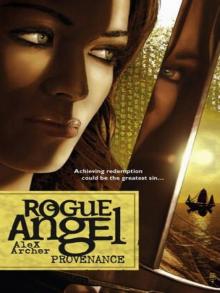 Provenance
Provenance Blood Cursed
Blood Cursed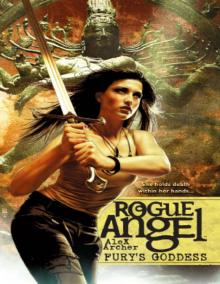 Fury's Goddess
Fury's Goddess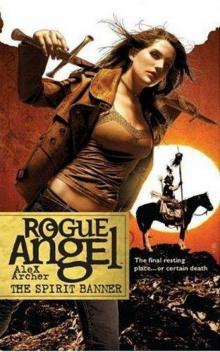 The Spirit Banner
The Spirit Banner Footprints
Footprints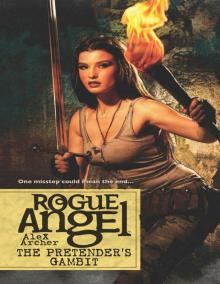 The Pretender's Gambit
The Pretender's Gambit Rogue Angel: The Lost Scrolls
Rogue Angel: The Lost Scrolls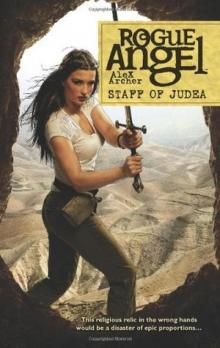 Staff of Judea
Staff of Judea Rogue Angel 55: Beneath Still Waters
Rogue Angel 55: Beneath Still Waters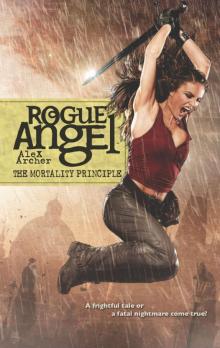 The Mortality Principle
The Mortality Principle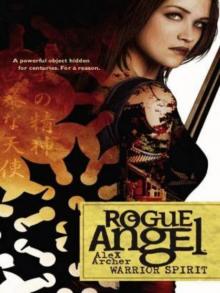 Warrior Spirit
Warrior Spirit Paradox
Paradox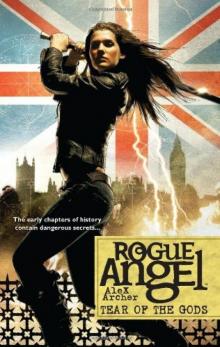 Tear of the Gods
Tear of the Gods Forbidden City
Forbidden City River of Nightmares (Rogue Angel)
River of Nightmares (Rogue Angel)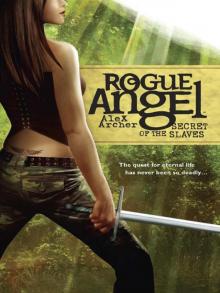 Rogue Angel: The Secret of the Slaves
Rogue Angel: The Secret of the Slaves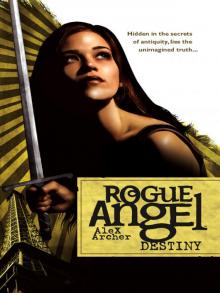 Destiny
Destiny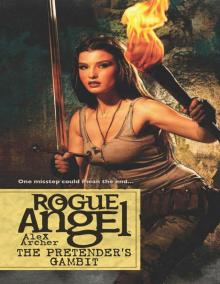 Rogue Angel 51: The Pretender's Gambit
Rogue Angel 51: The Pretender's Gambit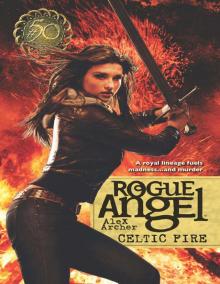 Celtic Fire
Celtic Fire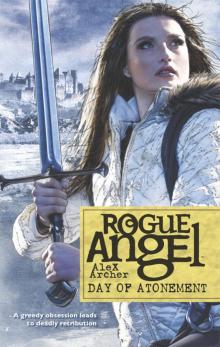 Rogue Angel 54: Day of Atonement
Rogue Angel 54: Day of Atonement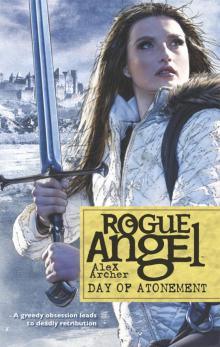 Day of Atonement
Day of Atonement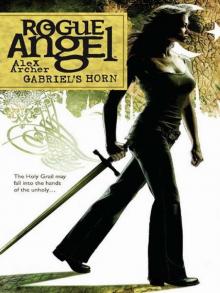 Rogue Angel: Gabriel's Horn
Rogue Angel: Gabriel's Horn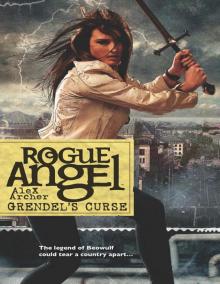 Grendel's Curse
Grendel's Curse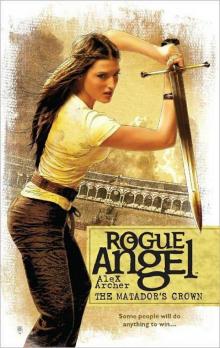 The Matador's Crown
The Matador's Crown Rogue Angel: The Chosen
Rogue Angel: The Chosen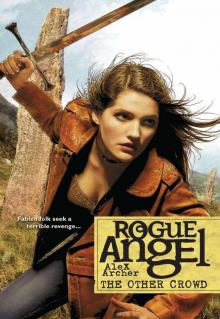 The Other Crowd
The Other Crowd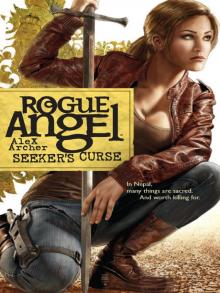 Seeker’s Curse
Seeker’s Curse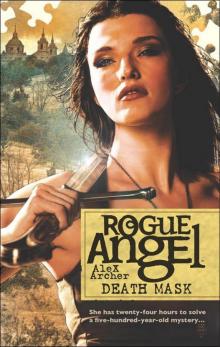 Rogue Angel 52: Death Mask
Rogue Angel 52: Death Mask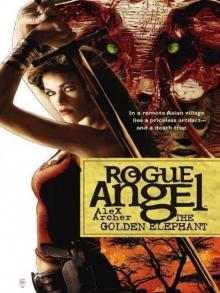 The Golden Elephant
The Golden Elephant Blood Cursed (Rogue Angel)
Blood Cursed (Rogue Angel)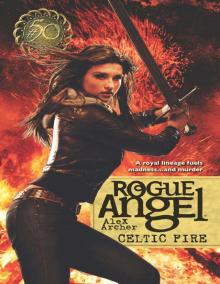 Celtic Fire (Rogue Angel)
Celtic Fire (Rogue Angel)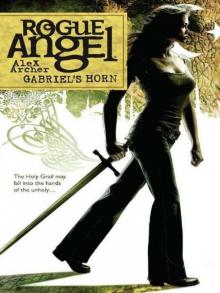 Gabriel's Horn
Gabriel's Horn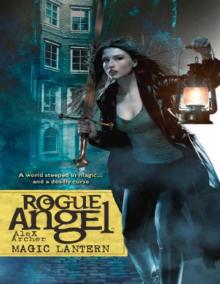 Magic Lantern (Rogue Angel)
Magic Lantern (Rogue Angel)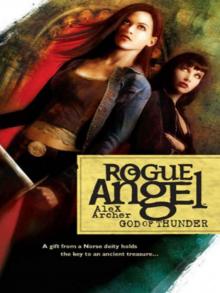 God of Thunder
God of Thunder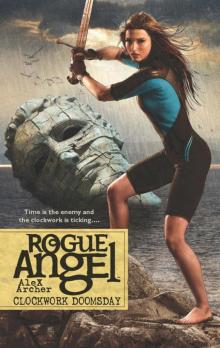 Clockwork Doomsday
Clockwork Doomsday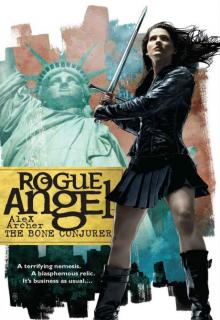 The Bone Conjurer
The Bone Conjurer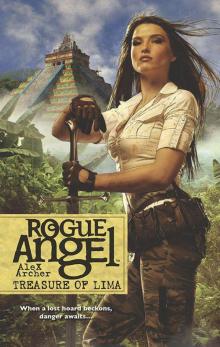 Treasure of Lima
Treasure of Lima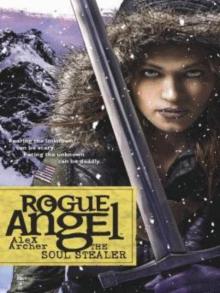 The Soul Stealer
The Soul Stealer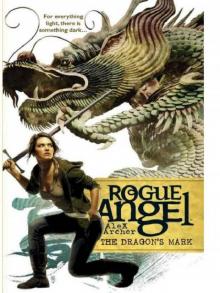 The Dragon’s Mark
The Dragon’s Mark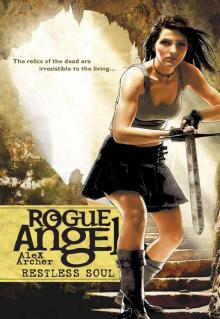 Restless Soul
Restless Soul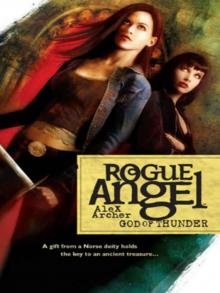 Rogue Angel: God Of Thunder
Rogue Angel: God Of Thunder Rogue Angel 49: The Devil's Chord
Rogue Angel 49: The Devil's Chord Death Mask
Death Mask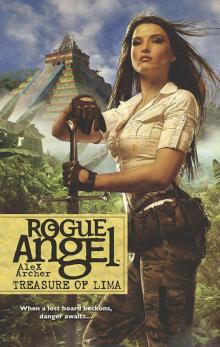 Rogue Angel 46: Treasure of Lima
Rogue Angel 46: Treasure of Lima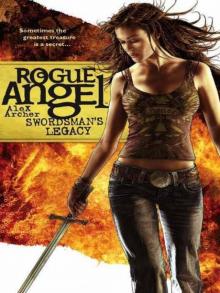 Swordsman's Legacy
Swordsman's Legacy The Oracle's Message
The Oracle's Message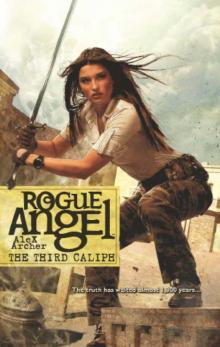 The Third Caliph
The Third Caliph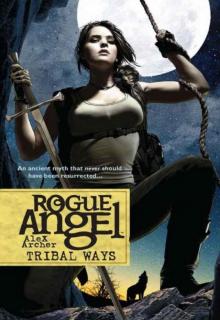 Tribal Ways
Tribal Ways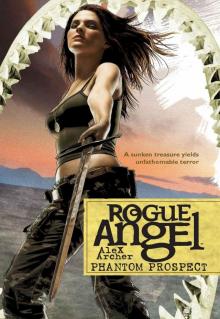 Phantom Prospect
Phantom Prospect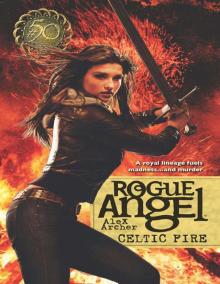 Rogue Angel 50: Celtic Fire
Rogue Angel 50: Celtic Fire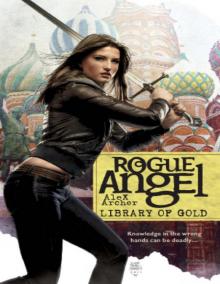 Library of Gold
Library of Gold Rogue Angel 53: Bathed in Blood
Rogue Angel 53: Bathed in Blood Sacred Ground
Sacred Ground The Devil's Chord
The Devil's Chord Serpent's Kiss
Serpent's Kiss The Vanishing Tribe
The Vanishing Tribe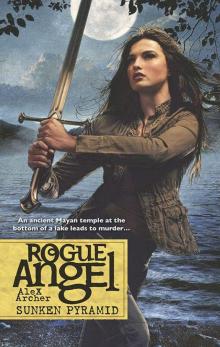 Sunken Pyramid
Sunken Pyramid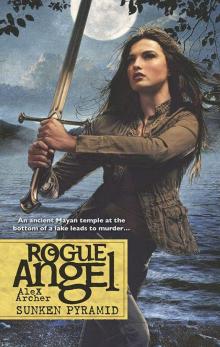 Sunken Pyramid (Rogue Angel)
Sunken Pyramid (Rogue Angel)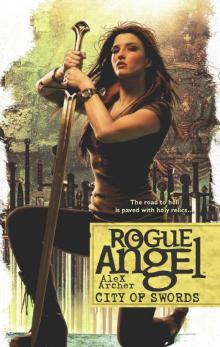 City of Swords
City of Swords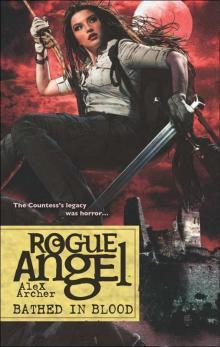 Bathed in Blood
Bathed in Blood The Lost Scrolls
The Lost Scrolls The Babel Codex
The Babel Codex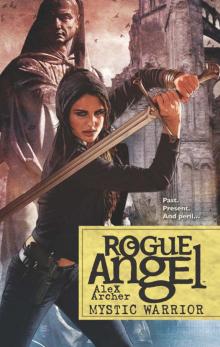 Mystic Warrior
Mystic Warrior Eternal Journey
Eternal Journey Beneath Still Waters
Beneath Still Waters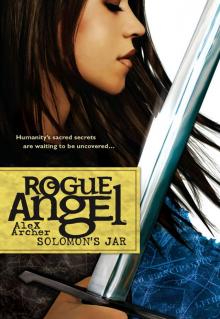 Solomon's Jar
Solomon's Jar Beneath Still Waters (Rogue Angel Book 55)
Beneath Still Waters (Rogue Angel Book 55) Cradle of Solitude
Cradle of Solitude Secret of the Slaves
Secret of the Slaves River of Nightmares
River of Nightmares Polar Quest
Polar Quest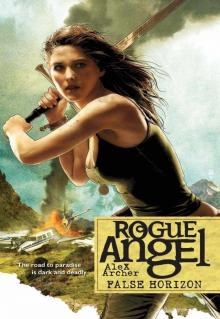 False Horizon
False Horizon